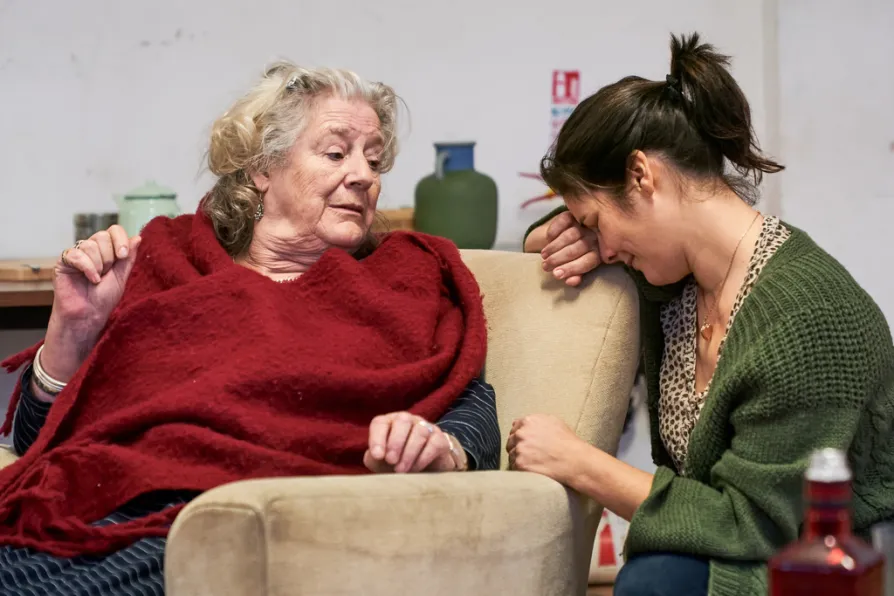STEVE JOHNSON relishes a celebration of the commonality of folk music and its links with the struggles of working people the world over

 MODERNIST MOMENT: Maggie Steed (left) in rehearsal for The Cutting Edge
MODERNIST MOMENT: Maggie Steed (left) in rehearsal for The Cutting Edge
LET’S face it — polymaths can be, at times, downright irritating.
They’re penning a new play in the morning, playing a little jazz piano at lunchtime, dusting their acting awards and accepting invitations to lecture in prestigious American colleges, all before the table is set for tea.
It’s doubtful that this actually describes Jack Shepherd’s average day but he does have all these accomplishments under his belt.
Readers might recall his leading role in TV series Bill Brand, Trevor Griffiths’s superb 1976 work, examining the struggles to remain socialist within Labour Party hierarchies and which feels painfully prescient now. It’s a joy to discover it’s available on DVD, though it might be best to watch from behind the sofa cushions.
Shepherd’s acting credentials are legion. In 1983 he originated the award-winning role of Richard Roma in new play Glengarry Glen Ross. In 1989, his first script In Lambeth explored a fictional meeting between William Blake and Thomas Paine and two decades later the epic piece Holding Fire! covered the rise and fall of the Chartist movement.
If that were a formidable task, this newest one sounds rather like juggling with fog. This week his new tragi-comic work The Cutting Edge, which he’s directing, opens at the Arcola Theatre in London. Saying that it tackles a challenging topic may be the understatement of the century. Making sense of modern art — even the thought of it invites a kind of delirium in most of us.
So, what’s the focus?
“There’s a strong theme of ‘the corrupting influence of the market,’ says the writer. “My feeling, with modernism, is that of course there’s a financial interest in keeping the whole thing going.”
He was immersed in the beginnings of the movement as a teenager. “I started off as an art student — that’s where it all stems from —and my experiences of modernism and the way it was taught by Victor Pasmore and Richard Hamilton, one a constructivist and the other who introduced pop art to this country and changed everything.”
The artist’s life, Shepherd decided, was not the one for him. “I quickly realised that the only future for me, in art, was as a teacher. I was staggeringly immature at 17. But the day I got my degree I realised that I’d be far better off as an actor.”
His play — and from the trailer online it’s a belter —includes a part for the magnificent Maggie Steed, who plays the key character of “ancient” woman artist Elvira. “[She] experienced the modernist movement when it was at its height in the 1920s and 1930s, with an international bohemian group who were in it not to make a profit but to make art,” Shepherd explains.
“My view about the modernist movement is that it’s declined. [It] depends on finding a new way of looking, a new way of realising what you want to say.”
He compares this to his beloved jazz, which, he says, died in the late 1960s. “After Coltrane and Miles Davis, there was nowhere else to go, and it was dead for 10 years, really. Then some musicians reinvented it, by going back to a style that was prevalent in the mid-50s. It lost its linear development, died and got reignited.
“One character in the play thinks it’s all a class conspiracy, the idea that the only reason art is becoming increasingly obscure is so that the cognoscenti have something that keeps them above the common herd.”
He cites Martin Creed’s controversial Turner Prize piece, of lightbulbs switching on and off — a work which later failed to sell at auction — and says: “Self-expression and self-indulgence are like terrible Lewis Carroll twins, you know? There’s the dark one and the light one and you don’t know which you’ll get.”
“You can never prejudge anything. My opinions about it are deeply inconsistent. The only way to really try and understand art is to have a go at doing it. Then you have something to measure yourself against, not things that are written in books, things that become fashionable and then unfashionable.
“Art critics, and those who run galleries, are usually upper middle class or lower aristocracy. These are safe subjects for posh kids. It’s a class thing.”
Shepherd is heartened that, in theatre, more young people are writing or inventing their own work.
“Now you more or less have to when you leave drama school, or you’re going to sink without trace. But if you’re prepared to create your own work, you can.”
But this polymath doesn’t have to invent his own work. Why this challenge?
“It has taken a long time to write. There have been five big drafts over at least 10 years. But the ideas and contradictions around when I was at art school have never been fully resolved.
“I find it very difficult to try and analyse what’s happening in art and if I find it difficult, as a former art student and as someone who still paints, what do other people think?”
The Cutting Edge runs from February 13 to March 21, box office: arcolatheatre.com

LYNNE WALSH reports from the Women’s Declaration International conference on feminist struggles from Britain to the Far East

Caroline Darian, daughter of Gisele Pelicot, took part in a conversation with Afua Hirsch at London’s Royal Geographical Society. LYNNE WALSH reports

This year’s Bristol Radical History Festival focused on the persistent threats of racism, xenophobia and, of course, our radical collective resistance to it across Ireland and Britain, reports LYNNE WALSH

LYNNE WALSH previews the Bristol Radical History Conference this weekend














